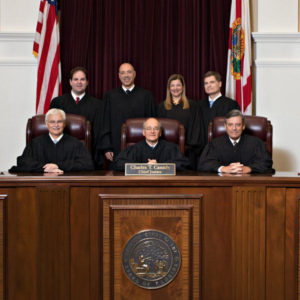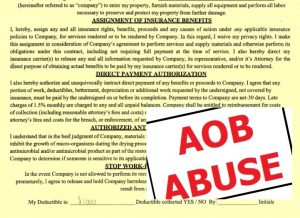Conflict in law from past practices remains

Justices of The Florida Supreme Court
A recent Florida Supreme Court decision to dismiss an Assignment of Benefits (AOB) case that it previously had agreed to review has left in limbo conflicting lower court rulings on whether insurance companies have had the right to deny AOBs without the sign-off of all parties with an insured interest. Regulators, an administrative judge, and one District Court of Appeal (DCA) had ruled they didn’t, while two other DCAs and common practice among a handful of carriers said they did. Going forward, it will ultimately be up to regulators, along with the adjusted rate.
On July 29, the Court announced it would not take-up Restoration 1 vs. Ark Royal Insurance Company, which we’ve been following closely in our newsletter. The court cited as its reason part of the new law (HB 7065) signed in June that “among other things permits an insurer to ‘make available a policy that restricts in whole or part an insured’s right to execute an assignment agreement’ if certain conditions are met,” the ruling said.
 The 4-3 decision had Chief Justice Charles Canady and Justices Ricky Polston, Jorge Labarga and Alan Lawson in the majority. The court’s three newest justices, Barbara Lagoa, Robert Luck and Carlos Muniz dissented. The ruling means Ark Royal’s 4th DCA victory stands, yet there remains a conflict in decisions between the 4th DCA and 5th DCA, which had ruled against Security First Insurance Company in a similar case. The question at heart was whether carriers could require the approval of all parties with a vested interest, including a mortgage company, for a post-loss AOB to be valid and the claim so recognized. There are pending AOB cases throughout Florida courts.
The 4-3 decision had Chief Justice Charles Canady and Justices Ricky Polston, Jorge Labarga and Alan Lawson in the majority. The court’s three newest justices, Barbara Lagoa, Robert Luck and Carlos Muniz dissented. The ruling means Ark Royal’s 4th DCA victory stands, yet there remains a conflict in decisions between the 4th DCA and 5th DCA, which had ruled against Security First Insurance Company in a similar case. The question at heart was whether carriers could require the approval of all parties with a vested interest, including a mortgage company, for a post-loss AOB to be valid and the claim so recognized. There are pending AOB cases throughout Florida courts.
The new law applies to new or renewed policies issued on or after July 1, 2019. Because it allows insurance companies to file a policy form that restricts assignments with an associated rate to reflect the restriction (i.e. a lower rate than a policy that allows benefits to be assigned), the real question is “what is the right rate?” Time will tell when a carrier decides to submit a policy form filing and corresponding rate filing to the Florida Office of Insurance Regulation (OIR). OIR should, during its review, look at the rates for the six or so companies that have been allowed to offer restricted policies for the past half dozen years. The rates of those policies can serve as a benchmark for new policy form filings that restrict AOBs. If our readers have questions, please contact us at [email protected]
LMA Newsletter of 8-12-19

